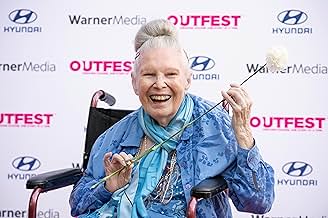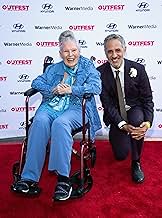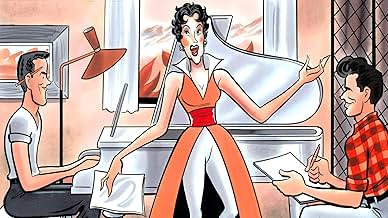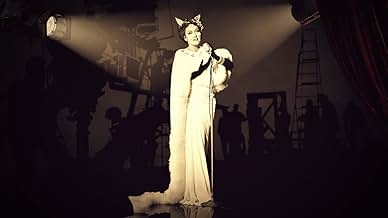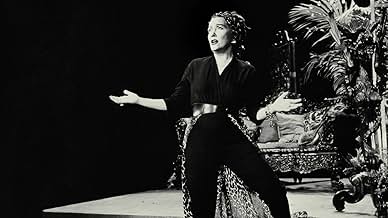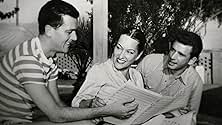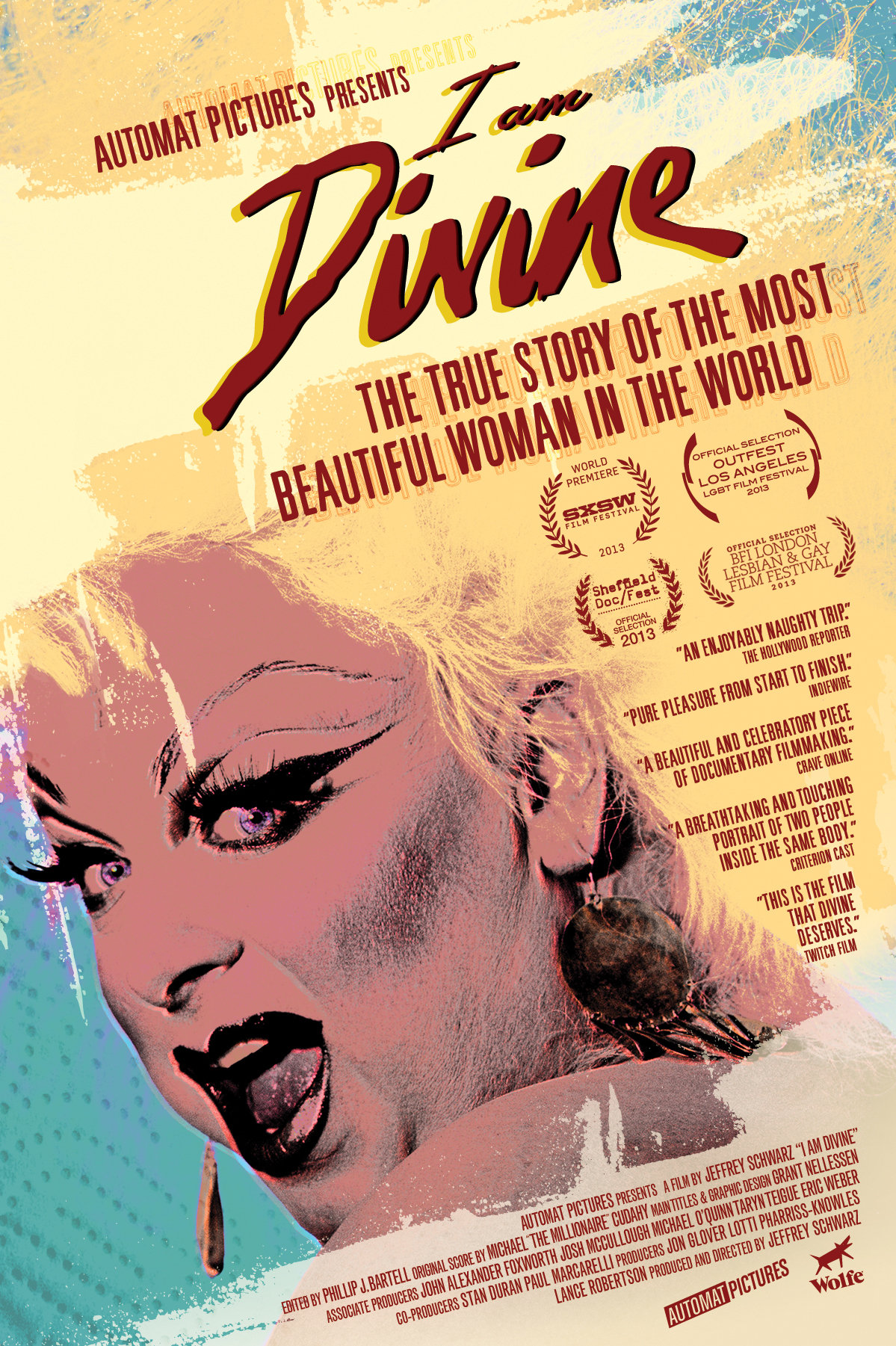Dickson Hughes e Richard Stapley, dois jovens compositores e parceiros românticos, encontram-se apanhados na teia da estrela de cinema Gloria Swanson.Dickson Hughes e Richard Stapley, dois jovens compositores e parceiros românticos, encontram-se apanhados na teia da estrela de cinema Gloria Swanson.Dickson Hughes e Richard Stapley, dois jovens compositores e parceiros românticos, encontram-se apanhados na teia da estrela de cinema Gloria Swanson.
- Prêmios
- 1 vitória e 1 indicação no total
Muhammad Ali
- Self
- (cenas de arquivo)
Steve Allen
- Self
- (cenas de arquivo)
Julie Andrews
- Self
- (cenas de arquivo)
Carol Burnett
- Self
- (cenas de arquivo)
Dick Cavett
- Self
- (cenas de arquivo)
Glenn Close
- Norma Desmond
- (cenas de arquivo)
Broderick Crawford
- Self
- (cenas de arquivo)
Ralph Edwards
- Self
- (cenas de arquivo)
Dickson Hughes
- Self
- (cenas de arquivo)
Avaliações em destaque
SUNSET BOULEVARD (1950) is, of course, one of the greatest American films of all-time, most film buffs would comfortably place among the top two dozen. The movie starred silent film legend Gloria Swanson and gave her what many consider second only to Scarlett O'Hara as the cinema's most iconic screen heroine, Norma Desmond. It was Swanson's first film in almost a decade and arguably her first major film in twenty years, a "comeback" (sorry, Norma, the word applies) to a level that has almost never happened before or since. Without it, Miss Swanson might be just as obscure with the general public of recent decades as such contemporaries as Norma Talmadge or Corinne Griffith. Swanson received a Best Actress Oscar nomination (arguably, her loss was the most unjust in Oscar history) and made her a household name again in America. She was able to keep her fame up to her death in 1982 thanks to the film's enduring fame, Gloria's multiple television appearances for the next thirty years, and a best-selling autobiography but getting another great film role proved fairly impossible, being in her fifties in an era when no film studio would dream of producing star vehicles for a woman of that age. Dabbling in music in during her "early talkie" career, Swanson came up with the idea of doing a Broadway musical on her screen triumph in the mid 1950's back when Andrew Lloyd Weber was just a schoolboy. A gay couple in Hollywood, struggling songwriter Dickson Hughes and unsuccessful actor Richard Stapley, were trying to get a career going running stage revues and nightclub acts and had a revue they thought Swanson might be interested in. She wasn't - but the fact that "songwriters" were eager to work with her thrilled her and she immediately tried to interest them in working on her dream project.
BOULEVARD! Can't help but make comparisons between what was going on with Gloria and the men to the plot of SUNSET BOULEVARD itself; this has been overdone many times in articles, books, and documentaries when some veteran star befriends some obscure writer or wannabe producer. In this case, it's unquestionable true, down to a bizarre scene when Swanson accidentally kills a baby chick that echos the death of Norma's pet monkey but especially when Gloria develops a romantic interest in Stapley if not as possessive as Norma's to Joe Gillis certainly even more improbable.
The production never gets very far though all continue to work on it even without any legal rights to the project, audaciously to the point of Swanson performing a number from the "upcoming musical" on a television variety series. For all of Swanson's astute vision (Broadway musicals based on films was almost unheard of at that point), there are the big problems in that the songwriters are not that good nor does Swanson have the voice to project while singing on the stage. Beyond an inability to get the rights secured, there's also no major interest from potential investors. And when it's clear Stapley has no romantic interest in her or possibly becoming husband number six, Gloria interest starts to wane as well although it takes some time before she completely gives up since there are no other projects on the horizon.
Classic movie buffs will eat this up with a spoon. There are many tantalizing snippets of rare footage of Swanson (candid and televison clips) that one longs to see more than the brief clips shown. Several film historians are interviewed including Cari Beauchamp and Swanson biographer Stephen Michael Shearer and Hollywood publicist Alan Eichler (whom many may know of thanks to his archive of amazing vintage videos on youtube), as well as brief comments from beloved Robert Osborne. Gloria's granddaughter also provides invaluable insights on her grandmother.
The movie is heavily illustrated with wonderful caricature art by Maurice Vellekoop although I do feel it was a mistake to use some of it for poster art which gives the impression it's a campy story rather than a nonfiction film that's straightforward and often moving.
Richard Stapley almost proves to be as fascinating as Swanson. A British actor who briefly had an MGM contact (though hardly considered "the next Clark Gable" as the film suggests though it may have BS hype that was told to him), the studio dropped him after supporting parts in just two films in the late 1940's. Good-looking but not the stunningly handsome man the commentors suggest (I personally think Dickson was better looking), he trudged through with generally small parts on film and television making no impact. Stapley was gay but played the Hollywood game by marrying a woman though it was pointless given his very minor career. And then he met Dickson Hughes, an aspiring musician and fell in love, becoming a couple.
Not long after the ties with Swanson were cut, their gay romance also fell apart and Stapley, now in his thirties returned to England. His career actually picked up working steady in leads and having filled out a bit, he got better looking as well. But again, stardom alluded him and it pretty collapsed yet again in the early 1970's.
But this story doesn't end there and with the success of the Weber musical, the history of the first attempt becomes known and is reworked by Hughes as a musical on their project much like this film, with Hughes audaciously not informing Stapley of the production and outing him on stage in the process. To add unintended new Sunset Boulevard touch, the elderly Hughes plays himself in the project with a young hunk half his age cast as Stapley! The filmed clips from that performance look like incredibly amateur, cheap production that looks like the worst smalltown little theatre project one could imagine and what we hear of the songs is certainly not promising. This is a fascinating story that true movie fans will love and despite that it's clear only the idea was the only good thing about the project, one ends up admiring not only Swanson but Stapley and Hughes.
BOULEVARD! Can't help but make comparisons between what was going on with Gloria and the men to the plot of SUNSET BOULEVARD itself; this has been overdone many times in articles, books, and documentaries when some veteran star befriends some obscure writer or wannabe producer. In this case, it's unquestionable true, down to a bizarre scene when Swanson accidentally kills a baby chick that echos the death of Norma's pet monkey but especially when Gloria develops a romantic interest in Stapley if not as possessive as Norma's to Joe Gillis certainly even more improbable.
The production never gets very far though all continue to work on it even without any legal rights to the project, audaciously to the point of Swanson performing a number from the "upcoming musical" on a television variety series. For all of Swanson's astute vision (Broadway musicals based on films was almost unheard of at that point), there are the big problems in that the songwriters are not that good nor does Swanson have the voice to project while singing on the stage. Beyond an inability to get the rights secured, there's also no major interest from potential investors. And when it's clear Stapley has no romantic interest in her or possibly becoming husband number six, Gloria interest starts to wane as well although it takes some time before she completely gives up since there are no other projects on the horizon.
Classic movie buffs will eat this up with a spoon. There are many tantalizing snippets of rare footage of Swanson (candid and televison clips) that one longs to see more than the brief clips shown. Several film historians are interviewed including Cari Beauchamp and Swanson biographer Stephen Michael Shearer and Hollywood publicist Alan Eichler (whom many may know of thanks to his archive of amazing vintage videos on youtube), as well as brief comments from beloved Robert Osborne. Gloria's granddaughter also provides invaluable insights on her grandmother.
The movie is heavily illustrated with wonderful caricature art by Maurice Vellekoop although I do feel it was a mistake to use some of it for poster art which gives the impression it's a campy story rather than a nonfiction film that's straightforward and often moving.
Richard Stapley almost proves to be as fascinating as Swanson. A British actor who briefly had an MGM contact (though hardly considered "the next Clark Gable" as the film suggests though it may have BS hype that was told to him), the studio dropped him after supporting parts in just two films in the late 1940's. Good-looking but not the stunningly handsome man the commentors suggest (I personally think Dickson was better looking), he trudged through with generally small parts on film and television making no impact. Stapley was gay but played the Hollywood game by marrying a woman though it was pointless given his very minor career. And then he met Dickson Hughes, an aspiring musician and fell in love, becoming a couple.
Not long after the ties with Swanson were cut, their gay romance also fell apart and Stapley, now in his thirties returned to England. His career actually picked up working steady in leads and having filled out a bit, he got better looking as well. But again, stardom alluded him and it pretty collapsed yet again in the early 1970's.
But this story doesn't end there and with the success of the Weber musical, the history of the first attempt becomes known and is reworked by Hughes as a musical on their project much like this film, with Hughes audaciously not informing Stapley of the production and outing him on stage in the process. To add unintended new Sunset Boulevard touch, the elderly Hughes plays himself in the project with a young hunk half his age cast as Stapley! The filmed clips from that performance look like incredibly amateur, cheap production that looks like the worst smalltown little theatre project one could imagine and what we hear of the songs is certainly not promising. This is a fascinating story that true movie fans will love and despite that it's clear only the idea was the only good thing about the project, one ends up admiring not only Swanson but Stapley and Hughes.
First of all, I personally think a musical version of sunset boulevard is a terrible idea. I think the dark, dramatic, gothic atmosphere created in the 1950 film version was important to the story. Dark and dreary, much like norma desmond's career, later in her life. Narration by song writers dick hughes and richard stapley. Director schwarz. Mark saltzman. Quite a bit of time spent on the personal and working relationship of hughes and stapley. The personal stuff had to be kept quiet at the time, of course. And this would undo stapley's acting career in the united states. But, according to dick and richard, swanson was getting jealous of their relationship. And theoretically, she didn't have the rights to make a musical from the film anyway. So everything kind of fell apart. Stapler moved back to britain, under the name richard wyler. Motorcycle racing. Then... years later, there would be two shows produced... swanson on sunset, at the cinegrill by gloria swanson. And the glenn close musical version of.... sunset boulevard, from andrew weber. A very interesting story, of a project that was years in the making, along with the people involved. One of whom was swanson, herself. Film buffs will dig watching this. An interesting piece of history that probably very few people knew about. Directed by jeffrey schwarz. They didn't seem to interview anyone outside the tight circle of friends. Glenn close, andrew weber, the newspapers giving the reviews. The copyright owners. It's interesting, but they could have dug deeper into some details.
Although a flawed documentary, thin on source material, it's nonetheless enjoyable if you're a fan of Gloria Swanson or interested in another take on homosexuality in Hollywood in the 1950s, well before Stonewall. It's difficult for many to understand that a mere 60-75+ years ago, gay identity did not yet exist. The few homosexuals who were open, or so obvious that no closet was even remotely possible, were living in an era before post-Stonewall conceptions of gay identity were born.
Boulevard is a window into that bygone era, as much as it is the telling of Gloria Swanson's effort to make Sunset Boulevard into a musical and remain a contemporary celebrity figure. And at this documentary's heart is a complicated love story between the two men Swanson used to try to bring a musical reinvention of Sunset Blvd., and herself, to Broadway in 1957.
So yes, if you're interested in Hollywood history, Swanson or Sunset Boulevard, absolutely worth showing up for. But watch also for a compelling pre-Stonewall lovestory between two very different men working in the arts.
Boulevard is a window into that bygone era, as much as it is the telling of Gloria Swanson's effort to make Sunset Boulevard into a musical and remain a contemporary celebrity figure. And at this documentary's heart is a complicated love story between the two men Swanson used to try to bring a musical reinvention of Sunset Blvd., and herself, to Broadway in 1957.
So yes, if you're interested in Hollywood history, Swanson or Sunset Boulevard, absolutely worth showing up for. But watch also for a compelling pre-Stonewall lovestory between two very different men working in the arts.
Gloria Swanson is likely best known for the great film noir "Sunset Blvd." from the '50's.
This documentary purports to be an account on a failed musical that Swanson wanted to do based on the movie (way before Andrew Lloyd Weber).
However, what it really amounts to is a re-hash of the original movie and some asides about Swanson's life.
The documentary is so thin and unoriginal that it practically plays clips of the ENTIRE Sunset Blvd movie, for heaven's sake!
This musical a less than minor footnote on her career. And who cares? No one. In fact, no one has ever heard of the two "collaborators" on this effort, as the documentary admits!
This documentary purports to be an account on a failed musical that Swanson wanted to do based on the movie (way before Andrew Lloyd Weber).
However, what it really amounts to is a re-hash of the original movie and some asides about Swanson's life.
The documentary is so thin and unoriginal that it practically plays clips of the ENTIRE Sunset Blvd movie, for heaven's sake!
This musical a less than minor footnote on her career. And who cares? No one. In fact, no one has ever heard of the two "collaborators" on this effort, as the documentary admits!
Você sabia?
- CuriosidadesPlayed at Outfest, Los Angeles LGBT film festival, 2021.
- ConexõesFeatures Don't Change Your Husband (1919)
Principais escolhas
Faça login para avaliar e ver a lista de recomendações personalizadas
Detalhes
- Data de lançamento
- País de origem
- Centrais de atendimento oficiais
- Idioma
- Também conhecido como
- Boulevard: Una historia de Hollywood
- Empresas de produção
- Consulte mais créditos da empresa na IMDbPro
- Tempo de duração1 hora 25 minutos
- Cor
Contribua para esta página
Sugerir uma alteração ou adicionar conteúdo ausente

Principal brecha
By what name was Boulevard! A Hollywood Story (2021) officially released in India in English?
Responda

